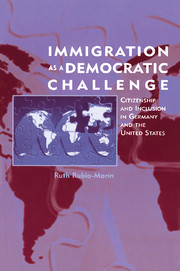Book contents
- Frontmatter
- Contents
- Acknowledgements
- 1 Introduction
- 2 A democratic challenge
- 3 Fair to whom?
- 4 Safeguarding liberal democracy from itself
- 5 Inclusion without consent
- 6 Keeping nationality relevant
- 7 The constitutional debate in the United States
- 8 The constitutional debate in Germany
- 9 Summary and final remarks
- Bibliography
- Index
- Index of Cases
4 - Safeguarding liberal democracy from itself
Published online by Cambridge University Press: 22 September 2009
- Frontmatter
- Contents
- Acknowledgements
- 1 Introduction
- 2 A democratic challenge
- 3 Fair to whom?
- 4 Safeguarding liberal democracy from itself
- 5 Inclusion without consent
- 6 Keeping nationality relevant
- 7 The constitutional debate in the United States
- 8 The constitutional debate in Germany
- 9 Summary and final remarks
- Bibliography
- Index
- Index of Cases
Summary
Democratic pluralism assumes that members of society will not organize around single interests of race, class or gender but will explore and discern their commonalities, coming together around certain issues and diverging on others in constantly changing configurations. Deliberate lies which deny these commonalities divide groups which might otherwise organize around mutual interests, and instead forge loyalties based on artificial and reified … identifications that do not permit society to perceive and pursue its various goals.
(R v. Zandel, per Cory and Iacobucci JJ., p. 232, in 95 Dominion Law Review 4th, 202 (1992))The claim to automatic incorporation sets certain limits on the freedom of a country to define the terms of admission of newcomers. More concretely, it questions the validity of indefinitely making the incorporation of permanent resident aliens to the body politic a matter of arbitrary discretion or of conditional access subject to the fulfilment of criteria, such as those generally recognized in naturalization laws and in the laws on the initial admission of aliens. Permanent resident aliens already belong to the polity. If anything, they should be part of the body which is legitimately authorized to decide about the incorporation of further members, instead of outsiders who first need to comply with certain conditions to gain recognition as members.
Rather than being deprived of its right to ‘self-definition’ concerning membership, I argue that the national community cannot exercise such a right vis-à-vis those whom it should consider full members according to democratic principles.
- Type
- Chapter
- Information
- Immigration as a Democratic ChallengeCitizenship and Inclusion in Germany and the United States, pp. 60 - 80Publisher: Cambridge University PressPrint publication year: 2000



